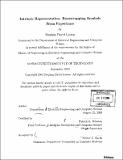Intrinsic representation : bootstrapping symbols from experience
Author(s)
Larson, Stephen David, 1980-
DownloadFull printable version (8.513Mb)
Other Contributors
Massachusetts Institute of Technology. Dept. of Electrical Engineering and Computer Science.
Advisor
Patrick H. Winston.
Terms of use
Metadata
Show full item recordAbstract
If we are to understand human-level intelligence, we need to understand how meanings can be learned without explicit instruction. I take a step toward that understanding by focusing on the symbol-grounding problem, showing how symbols can emerge from a system that looks for regularity in the experiences of its visual and proprioceptive sensory systems. More specifically, my implemented system builds descriptions up from low-level perceptual information and, without supervision, discovers regularities in that information. Then, my system, with supervision, associates the regularity with symbolic tags. Experiments conducted with the implementation shows that it successfully learns symbols corresponding to blocks in a simple 2D blocks world, and learns to associate the position of its eye with the position of its arm. In the course of this work, I take a new perspective on how to design knowledge representations, one that grapples with the internal semantics of systems, and I propose a model of an adaptive knowledge representation scheme that is intrinsic to the model and not parasitic on meanings captured in some external system, such as the head of a human investigator.
Description
Thesis (M. Eng.)--Massachusetts Institute of Technology, Dept. of Electrical Engineering and Computer Science, 2003. Includes bibliographical references (p. 95-96).
Date issued
2003Department
Massachusetts Institute of Technology. Department of Electrical Engineering and Computer SciencePublisher
Massachusetts Institute of Technology
Keywords
Electrical Engineering and Computer Science.